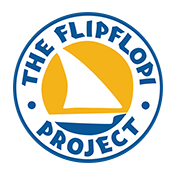Art and a Plastic Revolution – How a Theft Triggered New Thinking in Uganda
By Arinitwe Peter
The Nile Perch Ggaba beach sculpture served as a symbol of the devastating plastic pollution threatening the ecosystem in Kampala | © UMBER Studio + Flipflopi
I’m writing this blog at a crucial time for Uganda, both socially and environmentally. As citizens we’re living under strict national lockdown, our lives and livelihoods under threat, people are fighting for survival; meanwhile, our environment faces continual destruction.
In cities like Kampala, poor drainage systems and pollution blocking trenches have caused massive floods and new outbreaks of cholera especially in slum areas.
The pandemic is a dangerous reminder of what happens when humanity continues to destroy the environment.
As an artist, I am compelled to create when there is a need to create. In March this year, I joined the Flipflopi Lake Victoria expedition to help draw attention to the catastrophic impact of plastic pollution on our ecosystems. The reported death of the Nile Perch due to lack of oxygen in the lake’s water was my alarm to act.
Nnabagereka of Buganda on the Flipflopi at our Speke event | © UMBER Studio + The Flipflopi
Partnering with Flipflopi (the world’s first recycled plastic sailing boat) I designed and built a giant Nile Perch installation out of only waste materials and filled it with plastic trash – and planted it at the top of Gaba beach market – to leave a jolt in the minds of Kampala residents and a lasting sculpture designed for the benefit and engagement of the community around plastic pollution.
When the sculpture was unveiled in April 2021, it was seen as a positive moment in the East African campaign against plastics. It brought together Ugandans including school children, activists and community leaders who visited it to talk publicly about plastic pollution. Her majesty the Nnabagereka, and our Minister of the Environment who has just now announced the kavera ban also participated in the Flipflopi campaign and pledged their commitment to end plastic pollution.
It was with such sadness when I discovered recently that the sculpture had been stolen and dismantled – the trash left on the side of the road, the metal sold for probably just a few UGX. The theft has just exposed so many failings of our government: it has failed to protect young people left unemployed and struggling to survive during the pandemic, it has failed to engage people around issues relating to the environment, and failed to protect public education and the arts.
The lack of our leaders’ engagement and interest in all these issues is devastating for the future of Ugandans.
There are currently 32 universities in Uganda all accounting for a student population of about 110,000, turning out over 30,000 graduates annually but with only 1/10th of the jobs available. With this number of unemployed young people and lack of knowledge around art or the impact of pollution, it is not surprising that young people are now resorting to selling off the trash and small metal to survive.
The Jinja Scouts advocating for the plastic revolution | © UMBER Studio + The Flipflopi
What can we as artists do about it?
The theft of the sculpture just exposed to me how important the role of artists and young role models is in today’s world.
Public art and installations are so important to relate issues of great importance in a colourful and digestible way. As artists and activists, we should be compelled to keep our momentum and hopeful spirit alive during the most challenging time for our generation. I believe it’s important to keep art accessible to all Ugandans, and not be abstract or discriminatory– because it’s a way for everyone to learn quickly whether old, young, educated or illiterate.
Personally am not discouraged from the theft of the sculpture – it has only given me more energy to work harder to change beliefs and help share positive educational messages to my brothers and sisters in Uganda.
At the time of writing this blog, our Government just announced a positive environmental milestone – they will finally enforce the plastic bag ban that came into existence so many years ago but has never been implemented. I’m hopeful that they are finally taking such issues seriously. But it is critical that as artists and activists, we now help bring these matters to young people – like educating them on how to recycle and reuse plastic, to help bring income from the waste, whilst also reducing the reliance on plastics in our society.
I will continue to fight for social and environmental justice, and keep creating artworks that I hope will be preserved for future generations.
This blog has been written by Arinitwe Peter, A Ugandan artivist who participated in the Flipflopi Lake Victoria expedition. His views expressed in this blog and personal and not necessarily reflective of Flipflopi’s own political views of the situation in Uganda
If you'd like to stay up to date with Flipflopi events, milestones and achievements hit the button below to join our non-spammy mailing list!



